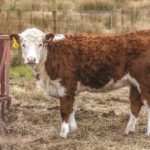 When questioned by photographer Nancy Bloom, this calf at the Mooney Farm on South Pamet Road denied posting “Keep Truro Rural” stickers around town. (Photo Nancy Bloom)
When questioned by photographer Nancy Bloom, this calf at the Mooney Farm on South Pamet Road denied posting “Keep Truro Rural” stickers around town. (Photo Nancy Bloom)
rural
VALUES
Officials Differ on Whether to Call Truro ‘Rural’
A discussion of priorities for next year reveals conflicting views
TRURO — An open-ended discussion of the select board’s values last week exposed conflicting points of view on several questions, including whether the town should describe itself as “rural.” Another point of contention was the definition of the term “sustainability.”
The rare in-person gathering of the Truro Select Board for an Aug. 6 work session was also attended by every department head in town government. The purpose of the session was to plan for Truro’s future, with discussion focused on the select board’s values, goals, and objectives for 2022.
The work session was moderated by former selectman Paul Wisotzky and was held in the Truro Community Center. With unflagging enthusiasm, despite the fact that the meeting lasted four hours, Wisotzky led the discussion from the front of the room. Writing on an easel pad as he spoke, Wisotzky explained that values, goals, and objectives are not the same things.
Wisotzky, a self-described lover of analogies, compared values to oxygen. “We need values in order to live our lives,” Wisotzky said. He faced some quizzical expressions in his audience. “They guide our lives and help inform our decisions,” he continued. “Everywhere you go, your values should come along with you.”
The select board considered multiple changes to its list of values from fiscal 2020. (The board did not have a values work session for fiscal 2021 because of the pandemic.) The 2020 list included excellence, integrity, openness and transparency, historic and environmental protection, fiscal integrity, diversity, and collaboration.
Wisotzky had conducted an anonymous survey of the select board before the meeting to elicit suggestions for changing or adding to the existing lists of values, goals, and objectives. (During the discussion that followed, the five board members often said which answers they had written.)
In the survey, one member asked to “stop describing Truro as a rural community.” The town is described as “rural” in the value “historic and environmental protection.”
Chair Bob Weinstein took up the case. “If you constantly refer to the community as ‘rural,’ it takes us away from looking at the part of the community that we can impact,” he said. Town Manager Darrin Tangeman added that describing the town as rural has “a significant impact on the financial aspect of planning,” though he did not specify how.
Board member Sue Areson said of dropping “rural” that “I’m not sure I’m comfortable with that. There are lots of people who moved here from suburban communities that look nothing like Truro.” Besides, she said, removing “rural” from descriptions of Truro might result in “an outcry.”
Wisotzky asked the department heads for their opinions. “Truro to me is different from Truro to Sue,” said Fire Chief Tim Collins, refering to Areson. “We want our Truro to stay our Truro. There’s no one here who wants Truro to become like the Jersey Shore.”
After nearly 15 minutes of debate, Wisotzky said that the issue might need to be tabled in order to move on with other questions, and it was.
Two members of the board separately proposed adding a value relating to “sustainability,” sparking a lengthy debate about the meaning of the word.
Tangeman said that conservation and sustainability can be at odds with each other, especially when conservation efforts impose additional costs of living. He said the long-term decline in the town’s population is not sustainable, and that making sustainability a value would mean pushing the town to grow its population.
Areson said that some new home owners in Truro who bought property or moved here year-round during the pandemic might not value the sustainability of the community. “It is my sense that some of them don’t care about the community,” she said.
Wisotzky moved on to goals and objectives, explaining, with another analogy, that if goals are the destination, objectives are the road directions.
At the suggestion of John Dundas, the newest member of the select board, the group eventually agreed to consolidate the five goals from 2020 into just two: “community sustainability” and “community engagement and governance.”
On the objectives, Tangeman reviewed for the board which of the 2020 objectives had been accomplished. Nine of 15 had been completed or mostly completed. All objectives not completed automatically roll over to the next year.
One of the questions in Wisotzky’s survey was “If the select board could only accomplish five things in the next year, what would they be?” Two members — plus Tangeman, who was also polled and whose answers were attributed to him — said that the town’s pending affordable housing projects, including the Cloverleaf in North Truro and the Walsh property adjacent to Truro Central School, were in their top four objectives for the coming year.
All five members and Tangeman said some form of affordable housing was a priority for them.
